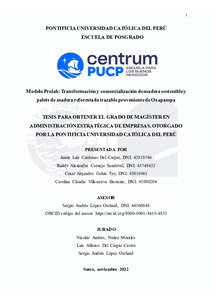| dc.contributor.advisor | López Orchard, Sergio Andrés | |
| dc.contributor.author | Cárdenas Del Carpio, Jaime Luis | |
| dc.contributor.author | Cornejo Sandoval, Ruddy Alexandra | |
| dc.contributor.author | Gohin Tay, Cesar Alejandro | |
| dc.contributor.author | Villanueva Bastante, Carolina Claudia | |
| dc.date.accessioned | 2023-02-17T20:16:29Z | |
| dc.date.available | 2023-02-17T20:16:29Z | |
| dc.date.created | 2022 | |
| dc.date.issued | 2023-02-17 | |
| dc.identifier.uri | http://hdl.handle.net/20.500.12404/24318 | |
| dc.description.abstract | El Perú es el noveno país con la mayor extensión de bosques a nivel mundial; y está
ubicado entre los diez países que más deforestan el planeta. La importancia de los bosques no
solo radica en ser la principal fuente de energía renovable sino en su importante rol para mitigar
los efectos del cambio climático (ONU, 2019) y su contribución para el desarrollo del país.
Por muchos años, nuestro país tuvo que convivir con el estigma de la tala
indiscriminada en reservas o zonas protegidas por la misma ignorancia de los pobladores (Vera,
2021). Este proyecto tiene como principal objetivo crear un modelo de negocio sostenible
basándonos en la necesidad de los trabajadores y del mercado. Se plantea hacer uso de
tecnología innovadora y procesos estandarizados para obtener un trabajo continuo para las
comunidades y a la vez suministrar un producto ecológico que permitirá que las empresas
puedan comprar producto de calidad a un menor precio que el extranjero.
Esta investigación tiene como fin la implementación de este modelo en la ciudad de
Oxapampa, quienes, como comunidad, siembran y talan los árboles para que estos sean
trasladados a la ciudad de Lima para su procesamiento. Nosotros creemos que es un nuevo
mercado que ayudará a muchas familias a formalizarse y reducir el fenómeno de deforestación
de los bosques.
Este proyecto fue sometido a la evaluación por los posibles clientes, obteniendo
resultados favorables de aceptación y financieros. Con una inversión de 1,286,599.62 dólares
obtenemos un VAN de 577,531.77 dólares y un TIR de 25.9%.
Se concluye que el proyecto de transformación de madera es un modelo sostenible y
responde a la ODS 8, 13 y 15. Específicamente se analizó el impacto de los palets reforestados
sobre la ODS 15 teniendo un IRS del 42%. | es_ES |
| dc.description.abstract | Peru is the ninth country with the largest extension of forests worldwide; and it is
located among the ten countries that deforest the most on the planet. The importance of forests
lies not only in being the main source of renewable energy, but also in their important role in
mitigating the effects of climate change (ONU, 2019) and their contribution to the country's
development.
For many years, our country had to live with the stigma of indiscriminate logging in
reserves or protected areas due to the same ignorance of the inhabitants (Vera,2021). The main
objective of this project is to create a sustainable business model based on the needs of the
workers and the market. It´s proposed to make use of innovative technology and standardized
processes to obtain continuous work for the communities and at the same time supply an
ecological product that will allow companies to buy quality products at a lower price than
abroad.
The purpose of this research is to implement this model in the city of Oxapampa, who,
as a community, plant and cut down the trees so that they can be deliver to Lima for processing.
We believe that it is a new market that will help many families to formalize and reduce the
phenomenon of deforestation of the forests.
Potential clients, obtaining favorable acceptance and positive financial results,
submitted this project to evaluation. With an investment of 1,286,599.62 dollars, we obtain a
NPV of 577,531.77 dollars and an IRR of 25.9%.
It´s concluded that the wood transformation project is a sustainable model and responds
to ODS 8, 13 and 15. Specifically, the impact of reforested pallets on ODS 15 was analyzed,
having an IRS of 42%. | es_ES |
| dc.language.iso | spa | es_ES |
| dc.publisher | Pontificia Universidad Católica del Perú | es_ES |
| dc.rights | info:eu-repo/semantics/closedAccess | es_ES |
| dc.subject | Negocios--Planificación | es_ES |
| dc.subject | Industria de la madera--Industria y comercio--Perú | es_ES |
| dc.subject | Sostenibilidad empresarial | es_ES |
| dc.subject | Responsabilidad social | es_ES |
| dc.title | Modelo prolab: Transformación y comercialización de madera sostenible y palets de madera reforestada trazable proveniente de Oxapampa | es_ES |
| dc.type | info:eu-repo/semantics/masterThesis | es_ES |
| thesis.degree.name | Maestro en Administración Estratégica de Empresas | es_ES |
| thesis.degree.level | Maestría | es_ES |
| thesis.degree.grantor | Pontificia Universidad Católica del Perú. CENTRUM | es_ES |
| thesis.degree.discipline | Administración Estratégica de Empresas | es_ES |
| renati.advisor.dni | 44560848 | |
| renati.advisor.orcid | https://orcid.org/0000-0001-8455-4833 | es_ES |
| renati.author.dni | 42018746 | |
| renati.author.dni | 45749432 | |
| renati.author.dni | 45816061 | |
| renati.author.dni | 45880204 | |
| renati.discipline | 413307 | es_ES |
| renati.juror | Nicolás Andrés Núñez Morales | es_ES |
| renati.juror | Luis Alfonso Del Carpio Castro | es_ES |
| renati.juror | Sergio Andres Lopez Orchard | es_ES |
| renati.level | https://purl.org/pe-repo/renati/level#maestro | es_ES |
| renati.type | https://purl.org/pe-repo/renati/type#tesis | es_ES |
| dc.publisher.country | PE | es_ES |
| dc.subject.ocde | https://purl.org/pe-repo/ocde/ford#5.02.04 | es_ES |






